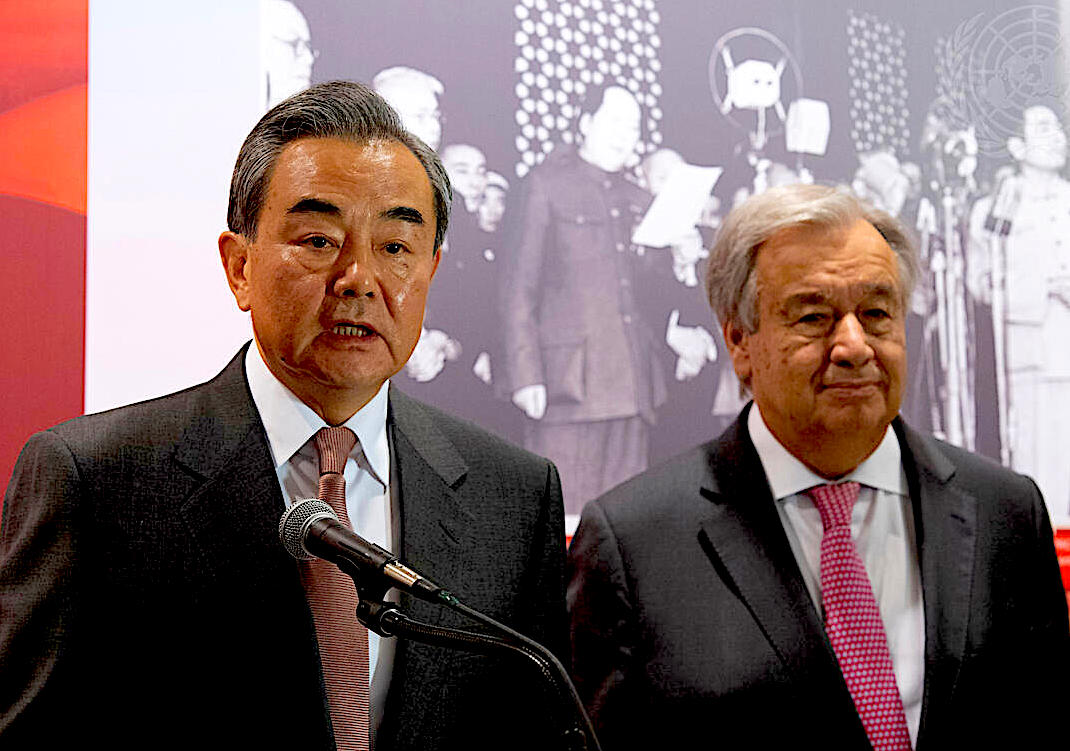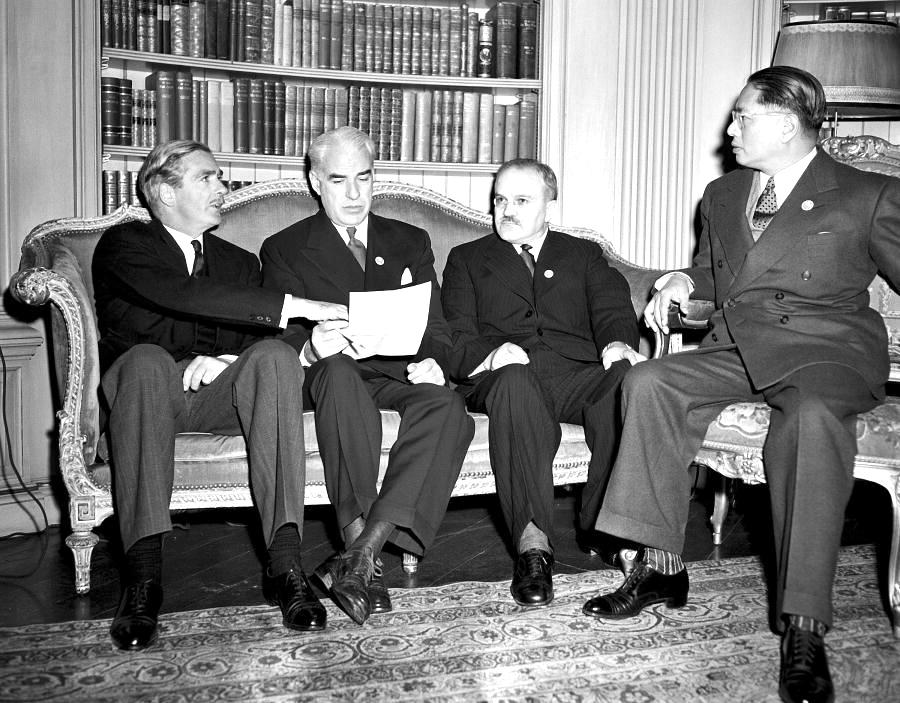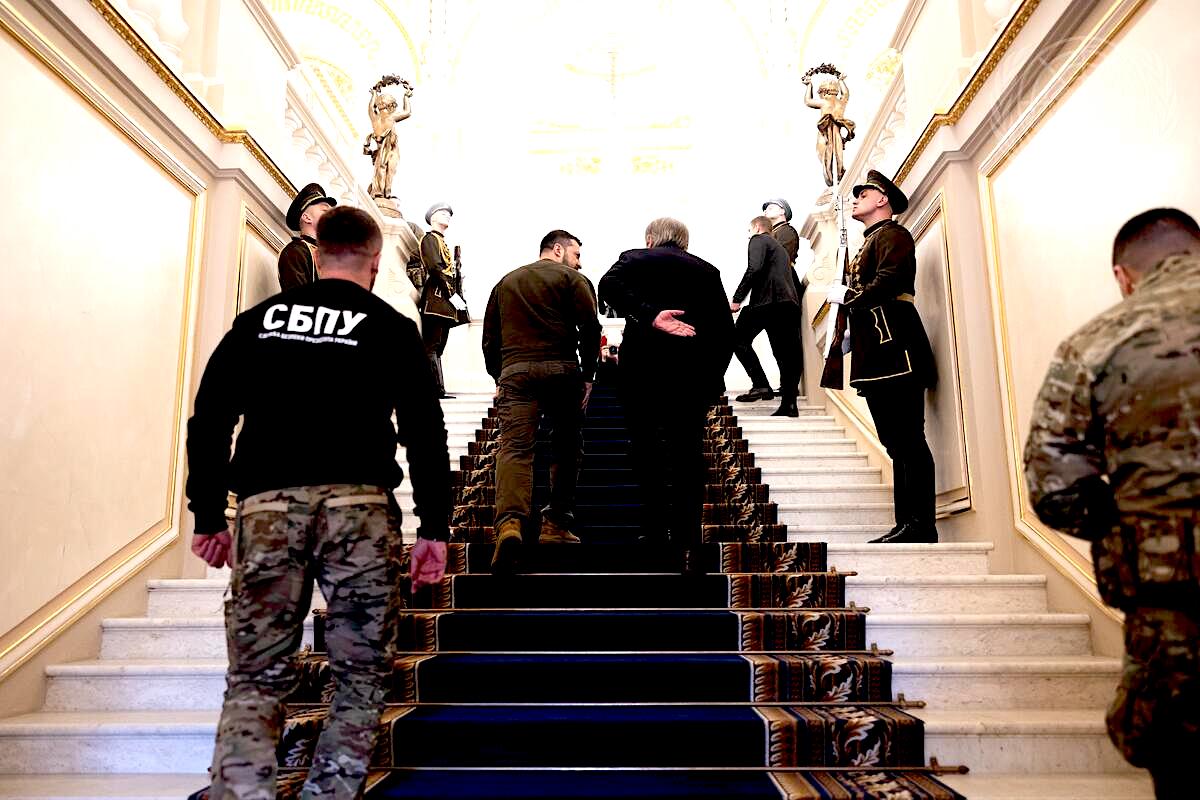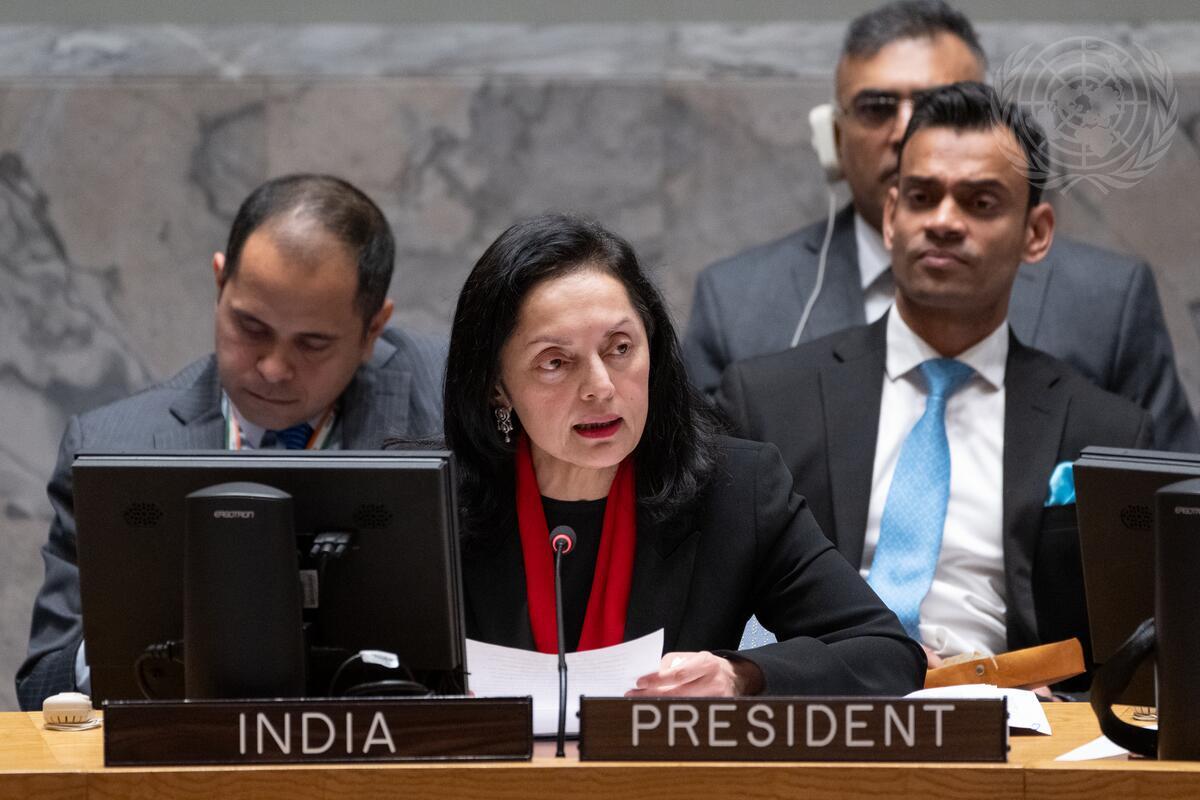Calls to reform the Security Council have been made many times in the past, but Ramzy Baroud says Beijing’s position is particularly important in both language and timing.

China’s Wang Yi, left, with U.N. Secretary-General António Guterres at a ceremony in 2019 marking the 70th anniversary of the founding of the People’s Republic of China. (U.N. Photo/Evan Schneider)
By Ramzy Baroud
MintPress News
 In anticipation of next month’s United Nations Security Council talks on reforming the inherently archaic and dysfunctional political body, China’s foreign policy chief, Wang Yi, stated his country’s demands.
In anticipation of next month’s United Nations Security Council talks on reforming the inherently archaic and dysfunctional political body, China’s foreign policy chief, Wang Yi, stated his country’s demands.
“The reform of the Security Council should uphold fairness and justice, increase the representation and voice of developing countries, allowing more small and medium-sized countries to have more opportunities to participate in the decision-making of the Council,” Wang Yi said in a statement on April 29.
More specifically, the new UNSC must “redress historical injustices against Africa,” he said.
Although calls for reforms of the UNSC have been made many times in the past, Beijing’s position is particularly important in both language and timing.
When the United Nations was founded in 1945 following World War II, it was meant to mark the rise of a new world order, one that was largely dominated by the winners of that horrific war, giving greater influence to the United States and its Western allies.
Indeed, of the 51 founding members of the U.N. back then, five countries were chosen to serve permanently on the Security Council — the executive branch of the U.N. The rest were given membership in the General Assembly, which played a marginal and, at times, even symbolic role in world affairs.

An informal meeting in the Fairmont Hotel in San Francisco during the 1945 signing of the U.N. Charter. From left: U.K.’s Anthony Eden, U.S.’ E.R. Stettinius Jr., Soviet Union’s V.M. Molotov and China’s T. V. Soong. (U.N. Photo/Eastman)
Six other nations were allowed to serve as non-permanent members of the council, though they were not granted the same veto power exercised by the five powerful U.N. Security Council members.
A few years later, in 1963, the non-permanent membership status, served through bi-annual rotations, was expanded to 10, expanding the number of U.N. Security Council members to 15. However, the “reforms” ended there, never to be revisited.
Reflecting World Realities
The U.N. was hardly ever a democratic platform fairly reflecting the realities of the world, whether based on economic influence, demographics or any other indicators — aside from military might and political hegemony.
From the post-WWII geopolitical realities, however, the U.N. perfectly expressed a sad, unfair, but true global power.
That power is now shifting, and rapidly.
Calls for reforms have been underway for many years, exprsesed by the Group of Four (G4) — Brazil, Germany, India and Japan — and the Sirte Declaration of the African Union (AU) in 2005, among others. But renewed calls for U.N. Security Council reform in recent months have become louder, more significant and, indeed, more possible.
The Russia-Ukraine war, which has divided the world into political camps, further empowers China — the world’s soon-to-be largest economy — and emboldened countries in the Middle East, Africa and South America.

U.N. Secretary-General António Guterres, center right, with Ukraine’s President Volodymyr Zelensky, center left, in Kiev on March 8 to negotiate the continuation of the Black Sea Grain Initiative. (U.N. Photo/Vitalii Ukhov)
Of the many indicators of a global power shift, the BRICS nations — Brazil, Russia, India, China and South Africa — have proven to be the greatest success story in challenging Western dominance over global markets and the status of the dollar as the world’s main currency.
As BRICS readies for a major membership expansion, it is poised to become the world’s leading economic forum — ahead of the powerful G7.
One of the BRICS members, India, as of April 2023, overtook China to become the world’s most populous country. Along with China and the combined demographics and wealth of other BRICS countries, it becomes unacceptable that a BRICS member such as India is still not a permanent member of the U.N. Security Council. The same applies to Brazil.
Indian U.N. Ambassador Ruchira Kamboj recently referred to the U.N. Charter as “anachronistic.” She said during a debate on the Charter: “Can we practice ‘effective multilateralism’ by defending a charter that makes five nations more equal than others and provides to each of those five the power to ignore the collective will of the remaining 188 member states?”

India’s U.N. Ambassador Ruchira Kamboj in 2022, while serving as president of the Security Council for the month of December. (U.N. Photo/Eskinder Debebe)
Her logic carries greater weight now that her country — along with other BRICS nations, the collective power of the African Union among other nations and political entities — is in a much stronger position to bargain for substantive change.
China, on the other hand, is already a permanent U.N. Security Council member, holding veto power.
The fact that Wang Yi is demanding serious changes at the U.N., particularly in the makeup of the Security Council, is a powerful indicator of China’s new global foreign policy agenda. As a rising superpower with close and deepening ties with many countries in the Global South, China rightly believes it’s in its interests to demand inclusion and fair representation for others.
This is an unmistakable sign of political maturity by Beijing, which will surely be resisted by the U.S. and other European powers.
The West is keen on either maintaining the U.N. Security Council’s West-leaning status as it is, or, if it must, engaging in superficial or self-serving reforms. This would be unacceptable for China and the rest of the Global South.
The U.N.’s reputation is already in tatters following its failure to address international conflicts, climate change, global pandemics and more. If the Council is not reformed to address global challenges more democratically, the U.N. risks its relevance.
Dr. Ramzy Baroud is a journalist, author and the editor of The Palestine Chronicle. He is the author of six books. His latest, co-edited with Ilan Pappé, is Our Vision for Liberation: Engaged Palestinian Leaders and Intellectuals Speak Out. His other books include My Father was a Freedom Fighter and The Last Earth. Baroud is a non-resident senior research fellow at the Center for Islam and Global Affairs (CIGA). His website is www.ramzybaroud.net
This article is from MPN.news, an award winning investigative newsroom. Sign up for their newsletter.
The views expressed are solely those of the author and may or may not reflect those of Consortium News.
Support CN’s Spring
Fund Drive Today


When China agrees to get rid of the veto power for the select few, including itself, I will believe they are serious about reform.
Until then they are doing exactly what the US did when the UN was formed; stacking the council with their current mates.
I will bet that not one of the countries with veto power will give it up.
The incoherently hypocritical power structure of the United Nation’s Security Council makes a mockery of the United Nations’ Charter and of the many human rights treaties and conventions the United Nations has promoted, something always reflected in the classes I taught on international and supranational law and institutions. Almost universally, my students correctly noted the Security Council’s absolutely undemocratic nature. The solution posited by my students was almost always to do away with the Security Council, rather than expanding its permanent membership, and to devolve its power to the General Assembly (acting as a parliament), with its decisions requiring a majority of both the number of member states and their combined population (a compromise somewhat melding the United States Senate and House of Representatives into a single institution).
Yes, but the UNGA alone will need a very well designed executive and judicial branches as well, all designed for internal checks and balances, with monitoring of all officials and associates for life against corrupt influence, before it can be trusted with great joint powers. It is an interesting problem. It must also have taxation authority over all members per GDP to ensure program funding.
The problem is that the powerful states have not ceded power to a de facto union of military, economic, and resource powers. That requires communication, abandonment of grudges and suspicions, and far better organizational design than that of most democracies so far. But of course it will be a great advance for humanity when it happens.
The precondition of communications and diplomacy cannot be met by primitive oligarchies masquerading as democracies, as in the West, who cede no equality to their own people. Most nations are at great variance in sophistication and government structures.
A new UN joining more civilized states could add members on conditions of individual rights, democracy, government structure, etc., but of course this would come at greatest cost to the sponsoring developed states. Autocracies and religious monocultures would remain on the margins for some time, with help in education and infrastructure by the developed states.
The essential problem is structuring democracy better than in the West, a very interesting problem never discussed in the West.
Does it not boil down to the fact the 5 western members are the key sponsors of the UN. They may argue that, “those who pay the fiddler, call the tune”, and all that..
Who the hell cares about arguments like that when most of the world’s objective is to find a fiddler whose heart is in the performance rather than in his tips. Let those 5 members continue to pay for the current fiddler if they prefer his performance and the rest of the world find a better one who isn’t tone-deaf and plays for the love of beautiful music.
I think the question is if we want to keep an organization that is incapable of solving a conflict; Ukraine is the last huge failure of UN. Actually, instead of finding peaceful solutions, UN has taken side and justified a war, what is the purpose of UN?
Eventually, China and the south will realize that UN has the same cultural DNA of western countries, instead of solving problems, address failures it sees them as opportunities for power grabbing.
China and the global south will create an alternative world organization, which will supplant UN, once its only supporters are western countries which have lost economic power and richness…
I think China and the south already know this, hence the push for change.
Very good. The alternative mid to long term is to let it die or be supplanted.
The entire issue here is the direct result of the NEOCON – Corporate – Deep State management of U.S. foreign policy for especially the last 73 years. Pretty pathetic for the so called leader of the “Free World”. Neither party has directly challenged the CIA’s mismanagement of U.S. foreign policy.
For that sin against humanity we all will pay a heavy price now.
I’m figuring the the Global South will exact a heavy price from the West in the process. Read it and weep!
Thanks CN
The UN’s head is definitely on the chopping block as the world needs an effective international legislature more than ever. It must first of move out of New York and be De-Americanized. US funding has dominated and been used as a control mechanism over policies and priorities.
A new head quarters might be rotated continentally every five years so there is less regional bias.
What about dissolving the UNSC and initiating rep by pop?
Oh, I like that idea Mr. Billyard—rotating the UN headquarters location. . Besides the UN was formed long enough ago for people to remember who helped to end WW2.. BUT America keeps thinking that that old history is still relevant—-The old America seems to have been in a much better mental space than the current one,
The UN is already irrelevant. It is a creature of the US and is totally incapable of navigating the great powers. Specifically it has been unable to address the war making and subversion that the US does around the world.
It is high time to realize that a handful of Security Council members (mostly from the Northern West) should NOT have the power to rule over the rest of us. And it is also high time to move the UN OUT OF THE US…and move it to Switzerland where it began without being under the Yankee boot. And the General Assembly should have much more say too and not just sit there.
In the current global crisis divisions over the reform of the UNSC is one more symptom that humanity is heading towards another world war. No agreement will be reached. The UN may survive; the League of Nations remained in place under 1945 – though obviously irrelevant. Preventing WWIII has to be focus.